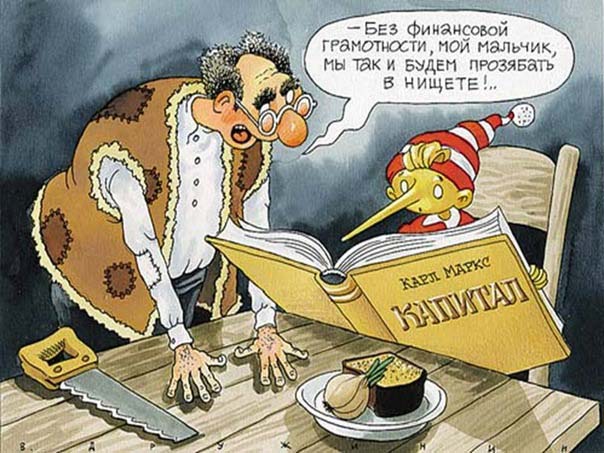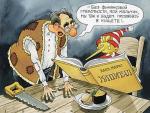What is financial literacy
Where does financial literacy begin?
What is financial literacy
I have long had the idea to write a separate article on the blog about financial literacy in the broad sense of the term. I am sure that it will be relevant for many readers, especially novice investors. Unfortunately, the stream of errors that I constantly hear from readers prove this relevance. I could not get around the issues of a competent attitude to one’s own, the culture and psychology of investing before, repeatedly touching on various aspects of this issue. For example, in his April post about, as well as in the reviews. Today I will try to approach the problem comprehensively and answer important questions:
- What does the concept of financial literacy include and where does it start?
- How does financial literacy affect investor success?
- How can an investor improve their financial culture and how does this determine your path to financial freedom?
Origin and content of the concept of financial literacy
I have been blogging for over 6 years now. During this time, I regularly publish reports on the results of my investments. Now the public investment portfolio is more than 1,000,000 rubles.
Especially for readers, I developed the Lazy Investor Course, in which I showed you step by step how to put your personal finances in order and effectively invest your savings in dozens of assets. I recommend that every reader go through at least the first week of training (it's free).
In order not to blur the subject of conversation, let's start with a definition. The following formulation is closer to me: financial literacy is a level of knowledge and skills in the field of finance, sufficient for a correct assessment of economic processes and for making informed decisions related to savings, investments, insurance, and future pensions.
The concept of financial literacy should also include qualified consumer behavior of a person. It is unlikely that you will argue with the fact that in the former USSR, which relatively recently built communism, most of the population does not even have elementary financial literacy. This historical legacy is difficult to overcome, and it affects even people working in the financial sector. I personally know bank employees who, having good incomes by Russian standards, constantly got into credit dependence and did not have a clear plan.
Alas, even having a higher financial education does not automatically guarantee financial literacy. Of course, the situation is gradually changing, but Russia is still ranked 24th in this indicator, next to Cameroon, Madagascar, Zimbabwe and Belarus (S&P study, 2015), and the number of financially literate people is 38%. The population of different countries of the world was surveyed for understanding of three questions:% rate (including), . The study revealed other sad details: Russians, on average, do not know what about 30% of their expenses go to, and 10% of the population plan their family budget for more than a month. 77% of families do not talk to their children about money at all, considering it reprehensible. In a word, in our country there is neither a mass tradition of financial planning, nor a wide dissemination of practical skills.

On occasion, we recall the gloomy stories with the post-Soviet ones - MMM, Vlastelina, Chara-bank, the Russian House of Selenga, Khoper Group, who robbed millions of our fellow citizens, taking advantage of their naivety and frivolous attitude to their own money. It is also true that the Russians are not unique in this: suffice it to recall the sensational company of Wall Street billionaire Bernard Madoff, who bankrupted thousands of gullible investors around the world and went to prison for 150 years in 2008. Unfortunately, in matters of financial education of our children, we cannot rely on the school. Lessons of educational program were introduced only from September 1, 2016, and even then it is optional. Therefore, it is important to constantly work on your financial self-education and set an example for all household members. And, of course, adhere to a managerial attitude to money, as opposed to such a widespread consumer approach (earned - spent).
How financial literacy affects investor success
Investors are a small wealthy part of the country's population, and many of them have typical misconceptions about money. In any case, it is not so easy to overcome them and reach a professional level: it takes time, effort and diligent mastery of useful knowledge and rules of conduct. Thinking about the topic of the article, I asked myself the question: how do professional financial qualifications and financial literacy in a broad sense relate to each other? Should an investor or experienced trader work on improving their financial culture, or does this only apply to people of other professions and laymen?
The answer is life itself. All of you, one way or another, have witnessed situations when a quite experienced account manager or trader on the stock exchange is not due to force majeure, but under the influence of stress, excitement, lack of where they should be. Often because of elemental greed. We are all living people, but lack of restraint in emotions, impulsiveness, light-hearted attitude to our own investment strategy is a violation of the rules of financial behavior and neglect of risk management. And that speaks to gaps in overall financial competence.

To paraphrase Eastern wisdom: a financially literate person who does not have money will acquire them sooner or later; a financially illiterate person who has a lot of money will definitely lose it.
How can an investor improve their financial literacy?
We approached the question of what methods and means a private investor can improve their own financial literacy, as well as influence the upbringing of their children in the right direction. I offer my own set of rules.
- A thoughtful, serious approach to money. Getting rid of consumer thinking and the transition to the formation of future ones that bring a stable (preferably passive) income.
- Accounting and planning of personal/family budget. The distribution of finances into revenue and expenditure, with itemized reporting, similar to a balance sheet. Change the family's attitude towards this process, make it an exciting quest, convince the family of the benefits and personal interest of everyone. Nothing motivates so much as honestly earned bonuses and gifts, and most importantly, the achievement of a jointly set common goal.
- Setting long-term financial goals that will motivate you to acquire financial knowledge and skills. It is desirable to provide additional income that allows part of the proceeds (from 10%) to be invested. Even if your current income from your main job allows you not to look for part-time jobs, an additional source can be both profit from investment and savings on existing expenses. The main thing is to start your investment practice as early as possible in order to form sustainable useful skills and thereby increase your financial literacy. I think that this is even more important than the profit received during this time.
- Building the right relationship with financial institutions: insurance companies, tax authorities, etc. The rules are simple: read the terms and conditions and the contract (even the small print). Do not take consumer loans without special need, do not allow overdue credit and tax debts. Do your own preliminary calculations, since now all calculators are online.
- Allocation of the budget for self-development (). Self-education, reading, courses, trainings, webinars, paid consultations - all this directly works to improve your financial skills. Much of this can be found online for free, discipline and motivation are more important here.
- Deal with financial instruments more often: nothing will raise your financial literacy like real activity. It is the lack of practice that makes people financially helpless.
Please note that I am not listing recommendations here on how to invest or trade profitably and safely, these are topics for other articles. I'm talking about the norms of behavior, without which the conditions for the continuous improvement of your financial literacy cannot be created. These are critical prerequisites for you and your family to make your way to financial freedom.








 Fat Burning Cardio: Benefits, Program Options, Helpful Tips
Fat Burning Cardio: Benefits, Program Options, Helpful Tips 7 most effective exercises for breast lift at home - a complex for women and girls
7 most effective exercises for breast lift at home - a complex for women and girls How to pump up at home in the shortest possible time?
How to pump up at home in the shortest possible time? Technique and important tips for doing the exercise
Technique and important tips for doing the exercise